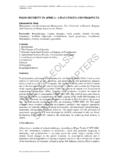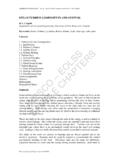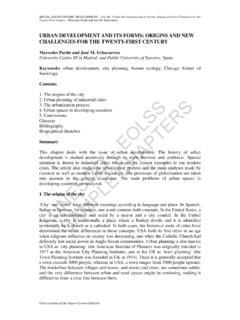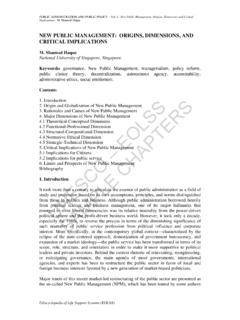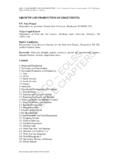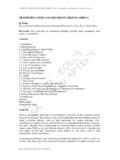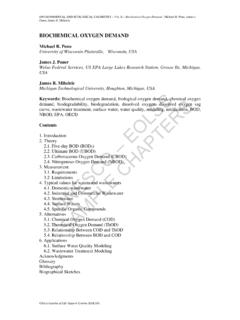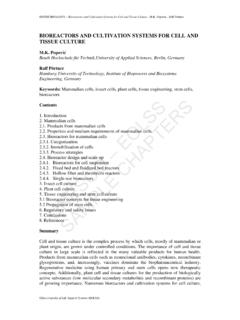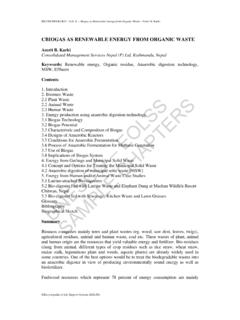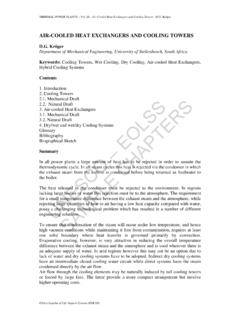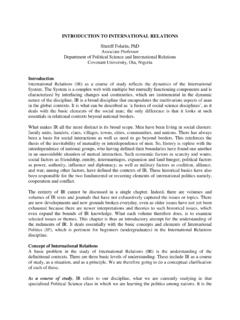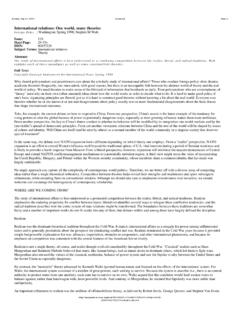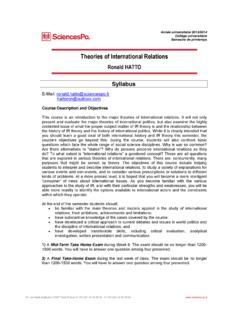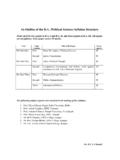Transcription of Actors in World Politics - Encyclopedia of Life Support ...
1 UNESCO EOLSSSAMPLE CHAPTERSGOVERNMENT AND Politics Vol. II - Actors in World Politics - Hideki Kan Encyclopedia of Life Support Systems (EOLSS) Actors IN World Politics Hideki Kan Graduate School of Social and Cultural Studies, Kyushu University, Japan Keywords: Global civil society, Global governance, Grotian perspective, Hobbesian perspective, International Governmental Organizations (IGOs), International Non-Governmental Organizations (INGOs), International regime, Kantian perspective, Marxian perspective, The New International Political Economy, Non-state Actors , Realism, Transnational Actors , Transnational corporations (TNCs), Transnational regime, World Order Models Projects (WOMPs).
2 Contents 1. Introduction 2. Defining and Identifying Actors in World Politics 3. The Declining Authority of States and the Rise of Transnational Relations 4. Different Perspectives and Actors in World Politics Hobbesian Perspective Marxian Perspective Grotian Perspective Kantian Perspective 5. Transnational Relations and Contending Theoretical Approaches 6. Conclusion Bibliography Biographical Sketch Summary It has been assumed that international relations consist of the relations between states. But such a definition of World Politics has been increasingly challenged since the late 1960s and the early 1970s, as many other Actors have become more and more involved in the international political process.
3 As a result, transnational relations permeate World Politics in almost every issue-area in which state and non-state Actors interact regularly across national boundaries. The globalizing and liberalizing forces in the last three decades of the twentieth century have fundamentally transformed the structure of the World economy, thereby undermining the ability of states to govern. These great global transformations have influenced and modified the traditional paradigm and theories of international relations, particularly the realist school of thought because of its basic premises that Actors are states, and states operate in a system of anarchy.
4 The realist school of thought has been criticized for its state-centric view of international relations as well as its narrow focus on the problem of war and peace. These challengers to realism (the new International Political Economy, regime theory, dependency and capitalist World -system theories, and the World Order Model Projects formulations) vary greatly in emphasis and objectives but they have incorporated non-state Actors and the new problematics in their theoretical frameworks. Consequently, the earlier arguments in the controversy in terms of a state-centric vs. a society-centric view of World Politics are largely replaced by the view that pays more attention to how the inter-UNESCO EOLSSSAMPLE CHAPTERSGOVERNMENT AND Politics Vol.
5 II - Actors in World Politics - Hideki Kan Encyclopedia of Life Support Systems (EOLSS) state system interacts with the World of transnational Actors , thereby identifying the conditions under which transnational Actors matter in a specific issue-area. States will remain central in carrying out the activities of governance but non-state Actors will also constitute an integral part of the various sites of competence, authority and legitimacy in the contemporary World . 1. Introduction It has been widely assumed that international relations consist of the relations between states. But such a definition of World Politics as simply the actions and interactions of states has been increasingly challenged since the late 1960s and the early 1970s as many other Actors have become more and more involved in the international political process (see Regionalism, International Regime, International System).
6 Almost nobody denies today that transnational relations exist in the contemporary World . Transnational relations, according to Thomas Risse-Kappen, are regular interactions across national boundaries involving at least one non-state actor or when such an actor does not operate in the interest of a national government or an intergovernmental organization. It is no exaggeration to say, as he claims, that transnational relations in this sense permeate World Politics in almost all issue-areas. In Section 2, an attempt will be made first to define Actors in World Politics and then to describe various Actors including states and non-state Actors in the present-day setting, focusing in particular on non-state Actors , which are attracting increased attention, not only from national governments but also from students of international relations.
7 In Section 3, it will be explained how such non-state Actors have led to the rise of transnational relations and the relative declining power and authority of states in the global system. This is followed in Section 4, by a discussion of four perspectives or World images as these perspectives or images are closely related to the way the role of Actors is posited in World Politics . In this section the four major perspectives, Hobbesian, Marxian, Grotian and Kantian, are taken up as they reflect their own images of international society as well as the basic concepts and assumptions which underline international relations theories of major significance today.
8 An attempt will be made here to tie the role of Actors with those four perspectives. In Section 5, the contending theoretical approaches will be discussed in the context of transnational relations, which are increasingly characterized today by the more intensified interactions not only between states but also between states and other transnational Actors . Taken up here are such schools of thought as realism, the new International Political Economy, the formulations of the participants in the World Order Models Project (WOMP), and the arguments of regime theorists. The examinations of these competing paradigms and theoretical approaches will reveal that each has its own strengths and weaknesses.
9 It will be also shown how these theories treat the role of Actors in theoretical explanations of the dynamics and transformations of international and transnational relations. Finally, this article will conclude with a brief discussion of the role of state and non-state Actors in relations to the future prospect for global governance and World order. UNESCO EOLSSSAMPLE CHAPTERSGOVERNMENT AND Politics Vol. II - Actors in World Politics - Hideki Kan Encyclopedia of Life Support Systems (EOLSS) 2. Defining and Identifying Actors in World Politics Actors in World Politics , states and non-state Actors , according to Professor Ryo Osiba of Hitotsubashi University, can be defined as the entities which have the following three features: (a) They should have the autonomous capacity to determine their own purposes and interests; (b) They should also have the capability to mobilize human and material resources to achieve these purposes and interests; (c) Their actions should be significant enough to influence the state-to-state relations or the behavior of other non-state Actors in the global system.
10 States remain the main Actors in World affairs and today there are less than 200 states (national governments) in the global system. On the other hand, non-state Actors are increasingly the focus of analysis among scholars as territoriality, the defining feature of the Westphalian state, has been steadily diminishing in relation to non-territorial, non-state Actors . Exactly, the most influential of these non-state Actors are international business firms often called transnational corporations (TNCs). According to the World Investment Report 1997 (UNCTAD, 1997 and 1998) there were 44 508 and 53 000 parent TNCs, having 276 659 and 450 000 foreign affiliates, respectively.
